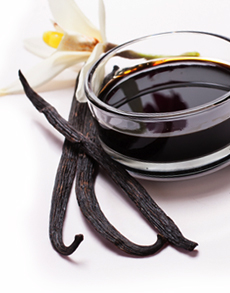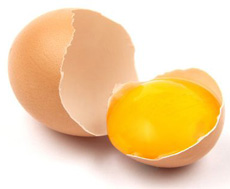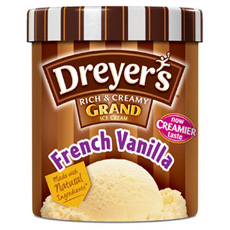|
A reader writes: What’s the difference between vanilla and French vanilla? Simply this:
Vanilla is the flavoring made from the vanilla bean Vanilla beans themselves are identified in the trade by origin: Indonesian, Madagascar (Bourbon), Mexican, Tahitian, etc. (see the different types (origins) of vanilla beans). Vanilla ice cream without eggs is called Philadelphia-style ice cream, dating back to the 18th century when it was developed as an alternative to French vanilla.
French vanilla is a classic French technique to enrich ice cream, by adding egg yolks to the recipe. The egg combines with the cream to create a custard base, which in turn provides a richer flavor, creamier texture, and a yellowish tinge to the color. USDA regulations require ice cream labeled “French vanilla” to be at least 1.4 % egg yolk.
Vanillin, artificial vanilla, is a cheaper alternative. It is used in products called vanilla-flavored.
Beyond ice cream, French vanilla refers to a vanilla flavor is caramelized, eggy, custard-like.
WHAT IS NOT FRENCH VANILLA
As with so many other terms, people misuse “French vanilla,” either through ignorance or for marketing. French vanilla, after all, sounds more exciting than vanilla.
Worse, “plain vanilla” has become an expression for bland and boring, the simplest version of something. It may be “plain vanilla,” but it’s still the most popular ice cream flavor in the U.S.
Products that have co-opted the French vanilla name include coffee creamers, flavored coffees and teas, vanilla-flavored drinks (shakes, lattes) and syrups.
It even extends to aromas, such as French vanilla candles and potpourri.
French vanilla means added eggs, and none of these products contains them.
MORE VANILLA FACTS
The small flecks of ground vanilla pod added by some manufacturers do not in of themselves indicate the best ice cream; in fact, the flavor is negligible if at all. They do, however, have eye appeal and may provide a bit of texture.
Vanilla bean versus extract: When using top-quality vanilla extract is near impossible to taste whether the ice cream is made from extract or by first infusing seeds from the pod in the cream.
Vanilla comes from a orchid variety called flat-leaved vanilla. The fruit of the plant is called the pod, which contains the beans that are used to make vanilla flavoring by extracting the flavor from the beans.
Most vanilla is made from Madagascar vanilla beans, also called Bourbon vanilla because the French Bourbons ruled Madagascar at the time. Vanilla is native to Madagascar.
ALSO CHECK OUT:
HISTORY & TYPES OF VANILLA
THE DIFFERENT TYPES OF ICE CREAM
CHOCTÀL SINGLE ORIGIN ICE CREAM, made in four different vanilla flavors using different vanilla beans, as well as chocolate ice creams made with cacao beans from four different origins
Plus:
Tahitian Vanilla
Caring For Your Vanilla Beans
|
|




[1] Vanilla beans, from a particular orchid, are most often converted into vanilla extract by soaking the seeds in an alcohol base (photo courtesy Natures Flavours). [2] To make French vanilla, egg yolks are required. They blend with the cream to create a custard, which makes the ice cream richer (photo courtesy ANH-USA.org). [3] Flavors called French Vanilla should have egg yolks, as this one does (photo courtesy Dreyers.com). [4] One of many examples where marketing trumps fact (photo courtesy Bigelow).
|





